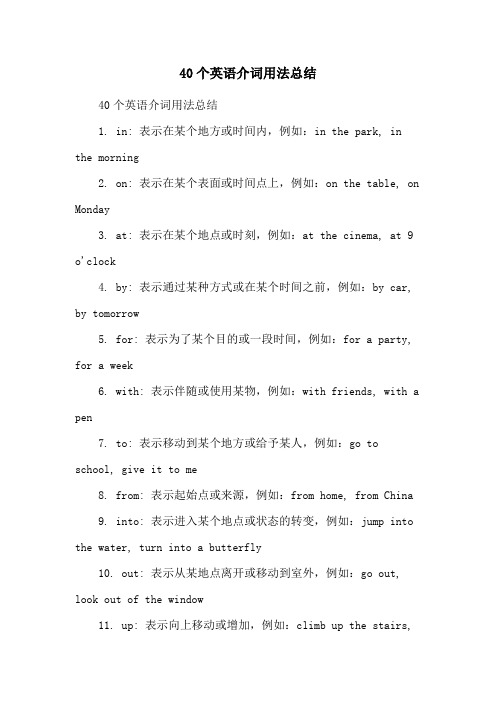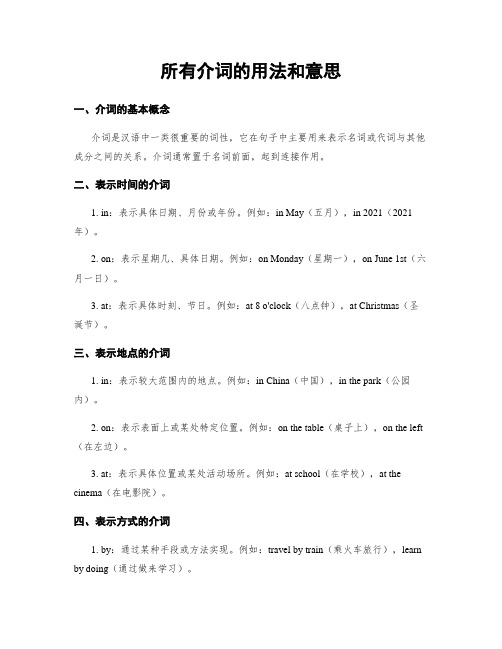个介词的基本用法
40个英语介词用法总结

40个英语介词用法总结40个英语介词用法总结1. in: 表示在某个地方或时间内,例如:in the park, in the morning2. on: 表示在某个表面或时间点上,例如:on the table, on Monday3. at: 表示在某个地点或时刻,例如:at the cinema, at 9 o'clock4. by: 表示通过某种方式或在某个时间之前,例如:by car, by tomorrow5. for: 表示为了某个目的或一段时间,例如:for a party, for a week6. with: 表示伴随或使用某物,例如:with friends, with a pen7. to: 表示移动到某个地方或给予某人,例如:go to school, give it to me8. from: 表示起始点或来源,例如:from home, from China9. into: 表示进入某个地点或状态的转变,例如:jump into the water, turn into a butterfly10. out: 表示从某地点离开或移动到室外,例如:go out, look out of the window11. up: 表示向上移动或增加,例如:climb up the stairs,wake up12. down: 表示向下移动或减少,例如:walk down the hill, calm down13. about: 表示关于某事或在某个范围内,例如:talk about the movie, wander about the city14. off: 表示离开或关闭,例如:get off the bus, turnoff the lights15. on: 表示打开或激活,例如:turn on the TV, switch on the computer16. over: 表示越过或在某地上方,例如:jump over the fence, fly over the city17. under: 表示在某物下面或被控制或影响,例如:hide under the bed, live under his rules18. with: 表示具有某种特征或和某人一起做某事,例如:a man with blue eyes, dance with me19. without: 表示没有某物或在缺乏某物的情况下,例如:go without food, live without regret20. by: 表示通过某种方式,例如:learn by doing, go by bus21. through: 表示穿过某物或完成某事,例如:walk through the door, go through the documents22. across: 表示横穿某物或在某个范围内,例如:swimacross the river, all across the world23. between: 表示在两个事物之间或在某个时间段,例如:choose between two options, between 9 and 10 o'clock24. among: 表示在三个或三个以上事物之间或在某群人中,例如:share among friends, discuss among colleagues25. around: 表示在周围或在某个时间点附近,例如:walk around the park, around midnight26. through: 表示通过某事物或在某段时间内,例如:read through the book, work through the night27. against: 表示反对或靠在某物上,例如:fight against injustice, lean against the wall28. for: 表示代表或支持某人或某事,例如:vote for a candidate, fight for freedom29. towards: 表示朝向某个方向或对某人有好感,例如:walk towards the beach, feel towards someone30. within: 表示在某个时间或范围内,例如:arrive within an hour, within the city limits31. beyond: 表示超出某个界限或超过某个程度,例如:beyond expectations, beyond the horizon32. along: 表示沿着某个路线或伴随某人一起,例如:walk along the street, sing along with the song33. above: 表示在某物之上或高于某个程度,例如:flyabove the clouds, above average34. below: 表示在某物之下或低于某个程度,例如:swim below the surface, below freezing35. beside: 表示在某物旁边或和某人一起,例如:sit beside me, beside the lake36. near: 表示在某物附近或接近某个时间,例如:live near the beach, near the end37. past: 表示经过某个地点或在某个时间之后,例如:walk past the store, past midnight38. around: 表示在周围或大约某个数量,例如:look around the room, around 20 people39. after: 表示在某个时间之后或追求某人或某事,例如:after dinner, run after the dog40. before: 表示在某个时间之前或在某个事件之前,例如:before sunrise, before the meeting这些介词是英语中常用的一些基本介词,它们在表达地点、时间、方式等方面起到了重要的作用。
介词的基本用法

介词的基本用法以下是 9 条关于介词的基本用法:1. 哎呀,咱先说“in”这个介词呀!你看,“I'm in the classroom”(我在教室里),它就是用来表示在某个范围或空间里面呢!就像人在一个大箱子里一样,是不是很形象呀?2. 嘿,“on”也很常用呢!“The book is on the table”(那本书在桌子上),这就是说在某个表面上呀,就像东西稳稳地放在那儿,多实在呀!3. 哇塞,“at”呢!“I'm at the bus stop”(我在公交站),它可以表示在一个具体的地点呀,是不是很明确呀!比如你约朋友见面,at 那个咖啡馆,多清晰呢!4. 你想想,“of”也很妙啊!“A slice of pizza”(一片披萨),它常常用来表示所属关系或者一部分呀,就好像从一个整体里切出来一小部分似的!5. 还有“from”呀!“He comes from Beijing”(他来自北京),这就是表明来源呀,就像从一个地方出发来到另一个地方,有意思吧?6. 哎呀呀,“with”也不能落下呀!“I go shopping with my friends”(我和我的朋友们去购物),它表示和谁一起或者带着什么呢,有没有感觉很亲切呀?7. 嘿哟,“for”呢!“This gift is for you”(这个礼物是给你的),这就是说为了谁或者给什么呀,是不是很直白地表达了心意呢?8. 哇哦,“to”也很重要呀!“I'm going to the park”(我要去公园),指引一个方向呢,就像你朝着目标前进一样,有没有那种动力呀?9. 最后说说“by”呀!“I go to work by bus”(我坐公交去上班),它能表示通过什么方式呀!想想看,我们坐公交、打车,不都是用 by 来表达嘛,多实用呢!我觉得介词真的是非常重要且有趣的呀,掌握好了它们,咱的英语表达就能更准确、更地道啦!。
介词的用法和举例子造句

介词的用法和举例子造句一、介词的定义和基本用法介词是英语中常见的一类词性,它在句子中充当连接词的作用,用来表示名词与其他成分之间的关系。
介词通常放在名词、代词或者动名词之前,构成介词短语。
下面将详细介绍介词的基本用法以及举例子造句。
1. 表示位置关系:- in(在……里面): My keys are in the drawer.- on(在……上面): The book is on the table.- under(在……下面): The cat is hiding under the bed.- at(在某个地点): We met at the park.2. 表示时间关系:- after(在后面): We can go for a walk after dinner.- before(在前面): I will finish my work before noon.- during(在期间): He fell asleep during the movie.- on(表示具体日期): We celebrate Christmas on December 25th.3. 表示方式或原因:- by(通过某种方式/手段):She came here by bus.- with(带有某种属性/特征):He is a man with great patience.- for(为了某个目的):I bought flowers for my mother's birthday.4. 表示目的或结果:- for(给予目标对象,针对某人或某物): I bought a present for my sister.- to(到达某个地点): He went to the supermarket to buy groceries.- so as to(为了做某事): She studied hard so as to pass the exam.二、举例子造句1. 表示位置关系:- The cat is sitting in the box, enjoying its newfound hiding spot.- The painting on the wall adds a touch of color to the room.- She found her missing necklace under the pile of clothes on her bed.- I will meet you at the café near your office.2. 表示时间关系:- We can go for a walk after dinner when it's cooler outside.- Please submit your report before 5 p.m. tomorrow.- During our trip, we visited many famous landmarks in Europe.- Our anniversary falls on September 10th this year.3. 表示方式或原因:- He solved the problem by using a calculator.- She is an artist with a unique style of painting.- I bought sunscreen for protection against harmful UV rays.4. 表示目的或结果:- He brought flowers for his wife on their wedding anniversary.- They walked to school together every day, talking and laughing along the way.- She worked hard so as to achieve her dream of becoming a doctor.总结:介词是英语中常用的词性,用来表示名词与其他成分之间的关系。
介词的用法和意思

介词的用法和意思一、介词的基本概念及作用介词是英语中非常重要的一类词性,可以用来引导短语,帮助语言实现更准确、丰富的表达。
作为一种连接词,它可以在句子中起到连接名词、代词、动词等不同成分的作用。
下面我们将详细介绍介词的用法和意思。
二、表示时间的介词1. at:表示具体时间点或某个时刻(如at 9 o'clock,在九点钟)。
例句:I usually have dinner at 7 o'clock.(我通常在7点钟吃晚餐。
)2. in:表示较长时间段或将来某个时间(如in three days,三天后;in the morning,在早晨)。
例句:He will arrive in two weeks.(他将会在两周后到达。
)3. on:表示星期几或具体日期(如on Monday,在星期一;on May 1st,在五月一号)。
例句:We have a meeting on Friday.(我们星期五有个会议。
)三、表示地点的介词1. in:表示大范围地理位置(如in China,在中国;in the city,在城市里)。
例句:She lives in New York City.(她住在纽约市。
)2. at:表示小范围地理位置(如at the park,在公园里;at the bus stop,在车站)。
例句:I met her at the airport.(我在机场遇见了她。
)3. on:表示具体表面(如on the table,在桌子上;on the wall,在墙上)。
例句:The book is on the shelf.(书在书架上。
)四、表示方式的介词1. by:表示通过某种方式或交通工具(如by car,乘坐汽车;by email,通过邮件)。
例句:I usually go to work by subway.(我通常乘坐地铁去上班。
)2. with:表示使用某物或与某人一同完成某事(如with a pen,用钢笔;with my friends,和我的朋友一起)。
介词的基本用法

介词的基本用法介词是语法中的一种词类,用来表示名词、代词等与其他词之间的关系。
介词通常位于名词短语前面,起到连接词语的作用。
本文将详细介绍介词的基本用法。
1. 表示地点关系介词常用于表示物体或人的位置关系,可以简明地描述地点。
例如:in(在)、on(在…上面)、at(在…旁边)、under(在…下面)等。
示例:The book is on the table.(书在桌子上。
)2. 表示时间关系介词还可以用于表示时间关系,精确描述某个事件发生的时间或持续的时间。
常用的表示时间关系的介词有:at(在某个具体时刻)、on(在某天或某个具体日期)、in(在某个时间段内)等。
示例:I will meet him at 9 o'clock.(我将在9点钟见他。
)3. 表示原因关系有些介词可以表示原因、理由或出发点,常用的有:for(为了)、because of(因为)、due to(由于)等。
示例:He went to the park because of the nice weather.(他因为天气好去了公园。
)4. 表示方式和手段介词也可以表示某个行动或状态发生的方式或手段。
例如:by(凭借、通过)、with(用、带着)等。
示例:She draws a picture with a pencil.(她用铅笔画了一幅图画。
)5. 表示目的和结果有些介词可用于表示某个行动的目的或结果,如:to(表示目的)、for(表示目的)、result in(导致)等。
示例:I am going to the supermarket to buy some groceries.(我去超市买些日用品。
)6. 表示比较和对比介词还可以用于表示比较和对比关系。
例如:than(比)、as(和…一样)、like(像)等。
示例:She is taller than her sister.(她比她妹妹高。
)总结:介词在语法中起到连接词语的作用,表示名词、代词等与其他词之间的关系。
所有介词的用法和意思

所有介词的用法和意思一、介词的基本概念介词是汉语中一类很重要的词性,它在句子中主要用来表示名词或代词与其他成分之间的关系。
介词通常置于名词前面,起到连接作用。
二、表示时间的介词1. in:表示具体日期、月份或年份。
例如:in May(五月),in 2021(2021年)。
2. on:表示星期几、具体日期。
例如:on Monday(星期一),on June 1st(六月一日)。
3. at:表示具体时刻、节日。
例如:at 8 o'clock(八点钟),at Christmas(圣诞节)。
三、表示地点的介词1. in:表示较大范围内的地点。
例如:in China(中国),in the park(公园内)。
2. on:表示表面上或某处特定位置。
例如:on the table(桌子上),on the left (在左边)。
3. at:表示具体位置或某处活动场所。
例如:at school(在学校),at the cinema(在电影院)。
四、表示方式的介词1. by:通过某种手段或方法实现。
例如:travel by train(乘火车旅行),learn by doing(通过做来学习)。
2. with:伴随或使用某物。
例如:go shopping with friends(与朋友一起去购物),write with a pen(用钢笔写)。
五、表示目的或原因的介词1. for:表示为了达到某个目标或出于某种原因。
例如:study hard for a better future(为了更好的未来而努力学习),I apologized for my mistake(因为我的错误我道歉)。
2. because of:因为某个原因。
例如:He couldn't come because of the bad weather(由于天气恶劣他不能来)。
六、表示方式的介词1. with:使用某种工具或方法来做某事。
介词的用法举例10个

介词的用法举例10个一、介词的概述介词是英语语法中非常重要的一部分,用来表示名词与其他词或短语之间的关系,起到连接作用。
在句子中,介词通常放在名词前面,以表达时间、地点、原因、方式等各种关系。
本文将为大家举例说明英语中常见的10个介词及其用法。
二、关于"at"1. 表示时间:at用来表示具体时刻,如at five o'clock(在五点)、at midnight (在午夜)。
2. 表示位置:at也可用来表示某个地点或场所,在这种情况下往往与表示建筑物名称的单数名词连用,如at the library(在图书馆)、at home(在家)。
3. 表示活动:at还可以表示特定活动和某种状态,如be at work(上班)、laugh at(嘲笑)。
三、关于"in"1. 表示范围:in可以表达某种范围或领域,在这种情况下常与空间名词连用,如in the city(在城市里)、in a room(在一个房间里)。
2. 表示位置:in还可以表示物体位于容器内部或者方位上,在这种情况下往往与封闭物体连用,如in a box(在一个盒子里)、in the corner(在角落里)。
3. 表示时间:in还被用来表示一段时间或季节,例如in summer(在夏天)、in the evening(在晚上)。
四、关于"on"1. 表示日期或某一天:on常用来表示特定的日期或某一天,在这种情况下通常与星期连用,如on Monday(在星期一)、on Christmas Day(在圣诞节)。
2. 表示表面:on也可以用来表示物体的表面,如on the table(在桌子上)、write on paper(写在纸上)。
3. 表示交通工具:on还可以表示乘坐交通工具或使用某种媒介,如get on abus(上公交车)、listen to music on the radio(听收音机播放的音乐)。
介词的基本用法

介词的基本用法介词是英语中一类常见的词汇,用于表示各种关系和位置。
在句子中,介词通常用来连接名词或代词,与其他词语形成短语,进一步表达句子的意思。
在本文中,我们将介绍介词的基本用法,并提供一些例子来加深理解。
1. 表示位置关系介词在英语中常被用来描述位置关系,包括在、上、下、旁边等。
以下是一些常见的表示位置关系的介词及其用法:- 在(on):表示某物在另一物体的表面或面上。
例如:The book is on the table.- 下(under):表示某物在另一物体下面。
例如:The cat is under the bed.- 在(in):表示某物在另一物体内部。
例如:The pencil is in the drawer.- 旁边(beside):表示某物在另一物体的旁边。
例如:The park is beside the supermarket.2. 表示时间关系介词也可用来表示时间关系,包括在、在...前、在...后等。
以下是一些常见的表示时间关系的介词及其用法:- 在(at):表示某一时间点。
例如:I'll meet you at 9 o'clock.- 在...前(before):表示在某一具体时间之前。
例如:Please finish your homework before dinner.- 在...后(after):表示在某一具体时间之后。
例如:I'll call you after I finish work.- 从...到...(from...to):表示一个时间范围。
例如:The shop isopen from Monday to Saturday.3. 表示方式、原因和目的介词还用于表示方式、原因和目的等。
以下是一些常见的表示方式、原因和目的的介词及其用法:- 通过(by):表示某种方式或方法。
例如:I go to work by bus.- 对于(for):表示某事情的目的或原因。
- 1、下载文档前请自行甄别文档内容的完整性,平台不提供额外的编辑、内容补充、找答案等附加服务。
- 2、"仅部分预览"的文档,不可在线预览部分如存在完整性等问题,可反馈申请退款(可完整预览的文档不适用该条件!)。
- 3、如文档侵犯您的权益,请联系客服反馈,我们会尽快为您处理(人工客服工作时间:9:00-18:30)。
6、around 基本含义:a-round”A在一个圆里面”(在一 定范围内)
• 1、在…周围:There are many bars around the towm. • 2、在附近、到处:I showed him around our campus. • 3、【adv】大约:
• There are around 1000 people watching the game.
4、after 基本含义:“A在B之后” (强调顺序)
• 1、在…之后 (时间顺序、空间顺序) • After dinner, they went out for a walk. • I should after him, but he still went on. • 2、照着…的样子 • Read the sentence after me, please. • The building is named after the famous hero. • 固定搭配: • 1、be after寻找/go after 追逐/run after 追求 • You should run after your own dream. • 2、after all不管怎样 (即:在任何事情之后都一样) • After all, he is your father. • 3、look after照顾
2、above 基本含义:a-b-over “A在B上方”
• 引申含义: • 1、在…上方:The sun rose above the horizon. • 2、数目大于…/重量超过…/价格(能力、地位)高于… • There is nothing in the store above 50 cents. • “He who comes after me is above me ,because he was before me” • 固定搭配: • 1、above all: 首先(强调重要性) • Above all, he was an outstanding mathematician. • 2、above all things: 最最… • What you need, above all things, is confidence. • 3、be above oneself: 兴高采烈=high spirit • When he heard the good news, he was above
• 1、小地点,或小时间点 • Usually, he is at his office in the morning. • I arrived at home at 7:00. • Knock at;look at;aim at;shoot at;arrive at… • 2、表示引发某种情绪或动作的原因 • He showed no sign of pleasure at seeing her. • Be surprised/excited at…
8、before 基本含义:“在…之前“(时间、空间、顺序)
一、44个常见介词的基本 用法
• 介词短语=介词+名词 • 基本介词 +单名词 • 合成介词 +多名词 • 双介词 +名词性从句
1、about 基本含义:a-b-out “A在B外面”
• 1、在…周围:The kids are sitting about their teacher. • I like the necklace about her throat. • 2、环绕:The bird always flies about the forest. • I plan to travel about the world. • 3、关于:a book about English study • They are talking about the new film. • 4、[adv] 大约 • 固定搭配: • 1、How about...? • 2、something+adj+about X • 一些关于X的adj的事
3、across 基本含义:a-grass “A走过一片草坪
• 引申含义: • 1、穿过:She walked across the road. • 2、在...对面: The bar is just across the street. • 3、交叉:He sat with his arms across his chest. • The two lines pass across each other at right angles. • 固定搭配: • 1、A come across B. A偶遇B。 • I came across Yu Minhong the other day. • 2、A ger sth across to B. A使某物被B了解。 • I want to get my theory across to all students.
5、against 基本含义:a-g-e“相对”
• 1、碰着、靠着:She was leaning against a tree. • 2、反对:We should fight against crimes. • 3、预防:Save money against a rainy day.未雨绸缪 • 固定搭配: • 1、go against 违反(故意违反某人的意志) • He chose to go against his family. • 2、be against • (1)违反(违反法律、制度) • It is against the law to hunt tigers. • (2)反对 Lincoln was strongly against slavery. • (3)不利于 What he said is against him.
